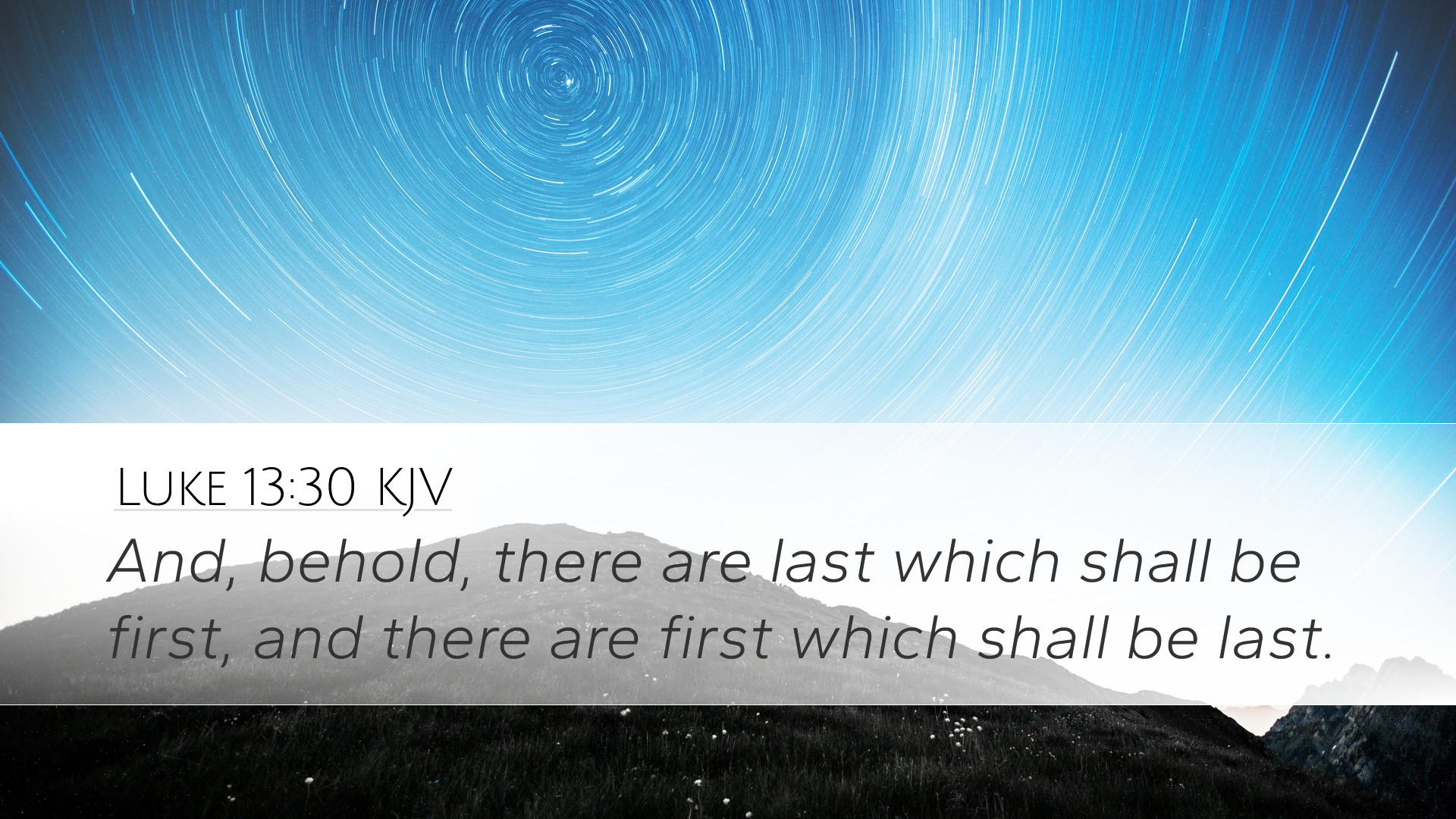Commentary on Luke 13:30
Verse Context: Luke 13:30 states: "And, behold, there are last which shall be first, and there are first which shall be last." This verse is in the context of Jesus' teaching about the narrow way to salvation and the unexpected inclusion of the outcast in God’s kingdom.
General Overview
This verse is a continuation of Jesus' teachings regarding the nature of the kingdom of God and the surprising order of salvation. It challenges social norms of the time, flipping expectations about who will be exalted and who will be humbled. The themes of humility, grace, and the divine reversal of human wisdom permeate the text.
Matthew Henry's Insights
The Nature of the Kingdom: According to Matthew Henry, this verse encapsulates the great reversal that characterizes the Kingdom of Heaven. He emphasizes that the last (those deemed least important by society) will ultimately find favor in God’s eyes, while the first (those who rely on their own merit or status) may be left out.
Application of Reversal: Henry notes the application of this principle to both the Jews and the Gentiles. He argues that many who were first (the Jews) in terms of receiving God’s covenant will find themselves last due to their rejection of Christ, while many Gentiles who were spiritually last will be received into the kingdom.
Albert Barnes' Commentary
Lessons on Humility: Albert Barnes helps to elaborate on the moral takeaway of this verse. He elucidates that the first shall be last as a reminder to the proud and self-righteous that personal merit is insufficient for salvation. Instead, it is humility and faith that enable one to enter the kingdom.
Salvation for All: He also emphasizes the inclusivity of the Gospel, stating that the promise of salvation is extended beyond societal boundaries. Barnes reinforces that Jesus brings hope to those marginalized and overlooked, assuring that they hold a place of honor in God’s plan.
Adam Clarke's Commentary
Divine Sovereignty: Adam Clarke reflects on the sovereignty of God in selecting who enters the kingdom, stating that it is not man's prerogative to determine who will come to salvation. Clarke points out that this verse should humble those who feel entitled to God’s favor based on their status or heritage.
Judgment and Accountability: Clarke highlights the theme of divine judgment implied in Jesus’ statement. There is an urgent call for self-examination: believers must consider how they pursue their relationship with God amidst the distractions of worldly status and acclaim.
Spiritual Significance
This verse serves as a weighty reminder that God's economy is often upside-down compared to worldly values. It should instill a sense of both caution and hope: caution for those who may be over-reliant on their standing or achievements, and hope for those who feel discarded or underestimated in their faith journey.
Theological Implications
- Grace Over Merit: Salvation is by grace alone and not by works, emphasizing the core Christian doctrine of justification by faith.
- Inclusivity of the Gospel: This highlights the calling of all peoples into God’s Kingdom, shattering barriers of race, class, and societal status.
- Challenge to Human Wisdom: It calls for a reevaluation of how human assessments of worth align with God’s view, pushing believers to prioritize spiritual over temporal values.
Conclusion
Luke 13:30 encapsulates the profound truth of the kingdom of God, inviting believers to embrace an attitude of humility while recognizing the unmerited grace extended to all. This verse calls us, as followers of Christ, to view others through the lens of God’s immeasurable mercy and to remember that in God’s eternal kingdom, the last shall be first.


